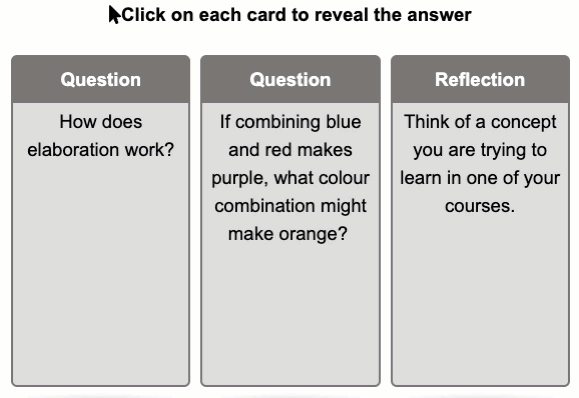Supporting Elaboration

Supporting Elaboration
Below are various means of supporting elaboration. You can build some of these assets and interactive opportunities into your courses and you can share these ideas with students so that they have a means of building elaboration into their own study sessions.
Customizable Tools to Support Elaboration
These tools have been designed to be customizable by faculty, and they can be embedded directly into your LMS content. For further information on how to utilize these tools in your LMS see the Interactive-Components page.
Flip Cards
Flip cards are often associated with retrieval practice, but they can also be useful for elaboration by asking application or open-ended questions or on the front of the card and providing feedback or further prompts on the back of the card.
Flip Cards Exemplar

Tips for Using Flip Cards
- Design flip cards to help students identify what information they need to know. Students often struggle with identifying what information is key and what is supplementary.
- Use a digital flip card deck to encourage students to stick with information until it is transferred to long-term memory. When students have the option to remove cards, they will often do so before they have retained the information (Karpicke, https://learninglab.psych.purdue.edu/downloads/2009/2009_Karpicke_JEPGeneral.pdf)
- Develop flip cards that present brief scenarios with hints for analysis or prompts for reflective activities. Providing multiple flip cards can enable students to select the topic that is most engaging for them.
Multi-select Questions
Multi-select questions are similar to multiple choice, but because they require students to select one or more correct options from a list of answers.
Multi-select Choice Quiz Tool Exemplar
EdTech Tools to Support Elaboration
There are many EdTech tools that can support you in embedding elaboration into the learning experiences you create. In addition, making students aware of some of the simpler tools below can also support them in building strategies to support more effective independent learning.
Using Elaboration Outside the Digital Space
To support students in building their own tool box of study strategies, encourage students to engage in the some of the following activities as they are preparing for your assessments.
Tips to Support Elaboration
The following are some quick tips that you can use when you are building your learning experiences to embed elaboration directly into the learning.
- Ask questions to help students generate meaning from the content. The questions should act as cues for reflection. Provide opportunities for students to check their answers.
- Create an elaborative framework of questions for students to access and apply. Using the same framework throughout the first half of a course will promote comfort and confidence in questioning skills from which to build upon in the latter half of the course.
- Encourage students to engage in their own elaboration to connect the new information with prior knowledge and share that information with peers. Multiple elaborative examples increase the depth and breadth of connection and may even provide connections for students who were unable to devise their own.
- Provide opportunities for students to rephrase content in their own words.
Checking Your Knowledge
References
Photography on this page used with permission from the Durham College Online Photo Database.
Boser, U. (n.d.). Science of learning: Research meets practice – elaboration. The Learning Agency Lab. https://www.the-learning-agency-lab.com/learning-strategies/elaboration/
Dunlosky, J. (2013). Strengthening the Student Toolbox: Study Strategies to Boost Learning. American Educator, 37(3), 12–21. https://files.eric.ed.gov/fulltext/EJ1021069.pdf
Dunlosky, J., Rawson, K.A., Marsh, E.J., Nathan, M.J., & Willingham, D.T. (2013). Improving students’ learning with effective learning techniques: Promising directions from cognitive and educational psychology. Psychological Science in the Public Interest, 14(1), 4-58. https://doi.org/10.1177/1529100612453266
Karpicke, J. D., & O’Day, G. M. (in press). Elements of effective learning. In M. J. Kahana & A. D. Wagner (Eds.), Oxford Handbook of Human Memory, Volume II: Applications. Oxford University Press. https://learninglab.psych.purdue.edu/downloads/inpress_Karpicke_ODay_Oxford_Handbook.pdf
The Learning Scientists. (n.d.). Elaboration. The Learning Scientists. https://www.learningscientists.org/elaboration
Weinstein, Y., Madan, C.R. & Sumeracki, M.A. (2018). Teaching the science of learning. Cognitive Research: Principles and Implications, 3(2). https://doi.org/10.1186/s41235-017-0087-y
Weinstein Y., & Smith, M. (2016, July 7). Learn to study using… elaboration. The Learning Scientists. https://www.learningscientists.org/blog/2016/7/7-1
© Durham College. All rights reserved.

